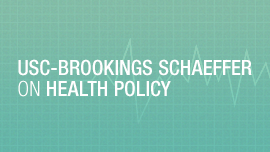Reforming the Medicare physician payment system has become a bipartisan priority. Last year a tri-committee bill emerged to repeal the Sustainable Growth Rate (SGR) and implement major reforms to move physician payment from a focus on volume to paying for innovative approaches which deliver higher-value care. Despite this unprecedented agreement, there remains significant disagreement about how to cover the cost of the bill, which was recently upgraded to $177 billion by the Congressional Budget Office (CBO).
The Merkin Initiative on Payment Reform and Clinical Leadership recently hosted an event that focused on Reforming Medicare Physician Payment: Fixing SGR While Improving Care. The program included keynote remarks from Patrick Conway of the Centers for Medicare and Medicaid Services (CMS), and Hon. Michael Burgess (R-TX) and Hon. Gene Green (D-TX) from the U.S. House of Representatives, who were lead sponsors of the 2014 legislation. Clinicians, payers, purchasers and policymakers came together to discuss opportunities for improving care and lowering costs, as well as the role that Medicare reform can play in these efforts.
“We strongly support the emphasis on outcome measures and use of electronic data…we thought that was critical…both EHRs and registries… if you really want to drive change, it’s not data six months later, it’s data that’s timely and actionable” – Patrick Conway, CMS
“It would be much more efficient and cheaper for us if we actually came to a full payfor and dealt with [the repeal of SGR] immediately.” – Rep. Gene Green
I’d rather spend our committee time talking about vaccination rates than SGR…. Next time let’s get together and talk about how we delivery better health care not how we pay for something that we should have fixed a long time ago.” – Rep. Michael Burgess
Discussions focused on the importance of clinician leadership and support through payment reform, not only by ending the disruptive and distracting short-term “doc fix” process, but also by assuring that the new payment methods represent strong linkages between payment and value. Speakers noted that meaningful payment reform is more important and closer than ever, and that the coming days are critical for implementing legislation ahead of the next expiration of the SGR “patch” at the end of March.
Speakers discussed key issues for effective payment reform legislation, including issues raised in a policy issue brief entitled Medicare Physician Payment Reform: Securing the Connection between Value and Payment. Several major opportunities for reform are discussed below.
Encouraging transition to effective alternative payment models (APMs): APMs aim to reduce our dependence on a ‘fee-for-service’ (FFS) model, and enable physicians to shift more resources to (and be rewarded for) approaches to care that they believe are most effective for patients. These models generally include increased provider accountability for actually improving care in measurable ways, as well as reducing costs. The legislation states that physicians who transition a significant amount of payments into APMs would qualify for a 5 percent bonus. Improvements to the legislation may include ensuring that APMs:
- Represent a real shift away from FFS, including either a reduction in FFS rates or the provider taking on some of the financial risk and cover multiple sites, services or providers
- Provide evidence from pilots that the models reduce overall spending
- Trigger additional incentives for providers who improve the quality of their measures of performance
Improving Medicare’s fee-for-service payment system: Currently Medicare physician fees are adjusted for some quality measures under the Physician Quality Reporting System (PQRS), the federal government’s meaningful use of electronic health records initiative; and most recently, for the value-based payment modifier. The legislation would combine all of these programs within a single consolidated payment adjustment system, known as the merit-based incentive payments system (MIPS), which increases the rate adjustment. Key improvements to the legislation include ensuring that:
- Bonuses are not calculated as a multiplier on FFS payments
- Providers who use and report on outcome-orientated measures should be able to receive larger bonuses than those who report only on process measures
- The difference in rates paid to providers based on their care setting (hospital vs. non hospital) should be removed
Improving quality measures: The SGR legislation took some important steps to advance the use of quality measures by aligning the various quality programs described earlier, encouraging the use of electronic health records, and by providing funding for the development and stakeholder endorsement of quality measures. There are still, however, significant gaps to ensure that quality measures are meaningful, and that physicians use them effectively. Important considerations include:
- Patient experience and engagement should be key measures for reporting and payment adjustments
- CMS should provide support for developing and implementing better performance measures including access to timely and relevant Medicare data and building capacity for physicians to calculate performance measures based on those data
- Core measures should be based on input from an independent, multi-stakeholder process
The Brookings Institution is committed to quality, independence, and impact.
We are supported by a diverse array of funders. In line with our values and policies, each Brookings publication represents the sole views of its author(s).




Commentary
How to reform Medicare physician payment and the Sustainable Growth Rate
February 5, 2015